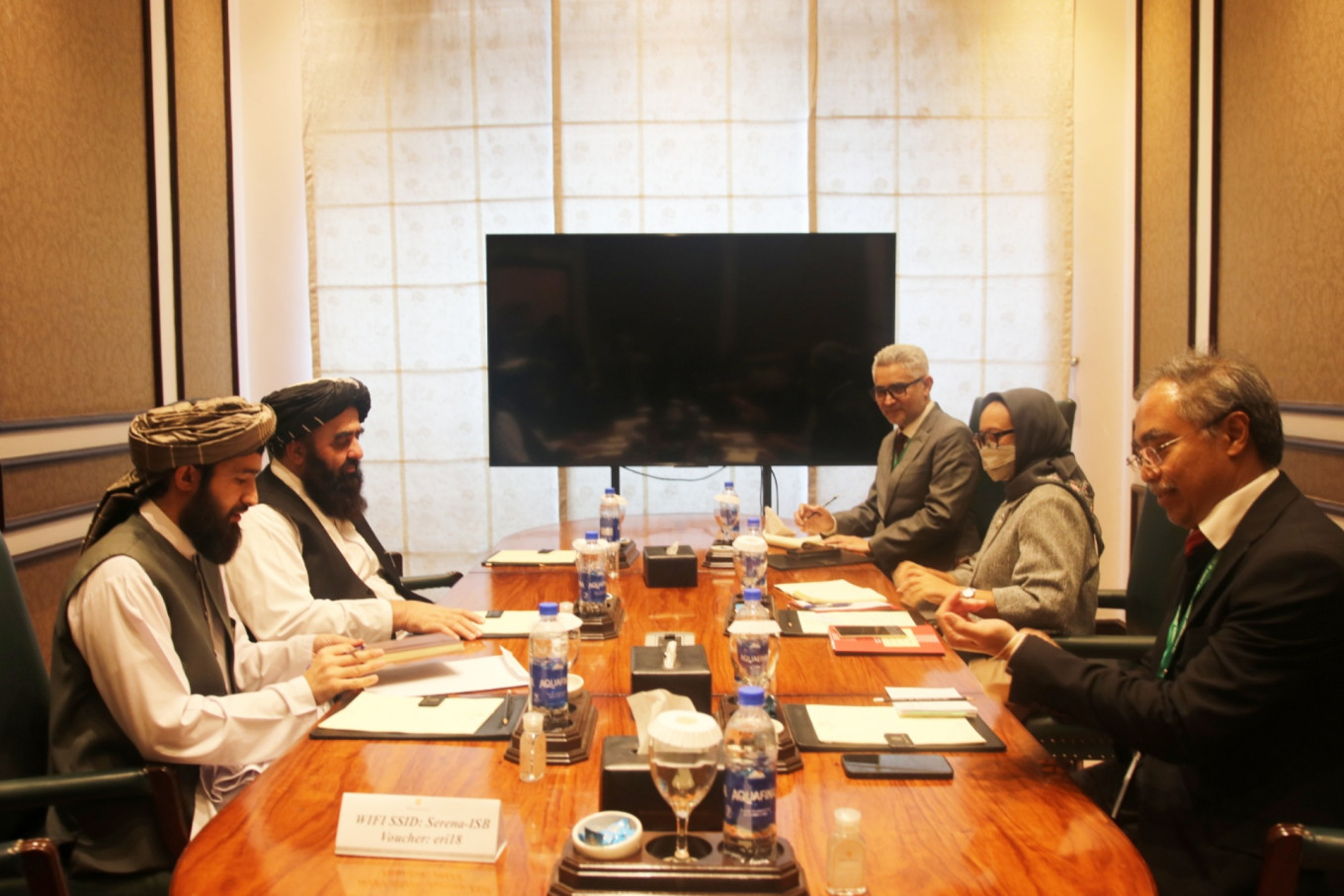Popular Reads
Top Results
Can't find what you're looking for?
View all search resultsPopular Reads
Top Results
Can't find what you're looking for?
View all search resultsIslamic groups urge ‘wait and seeʼ approach to Taliban recognition
Islamic organizations and scholars are suggesting the government to be cautious should it decides to open talks with the Middle Eastern country.
Change text size
Gift Premium Articles
to Anyone
W
hile Indonesian Islamic groups and scholars have supported the government’s official position of not recognizing Taliban-led Afghanistan, they suggest caution should the government decide to open talks with the rulers of the Middle Eastern country.
Representatives of Afghanistan’s Taliban government traveled to Indonesia earlier this month, with Kabul saying they held meetings with politicians in Jakarta.
The Taliban administration, which took back power in Afghanistan two years ago, is reportedly trying to achieve recognition of its rule across the Islamic world. This includes courting Indonesia to boost political and economic ties.
However, the Foreign Ministry has insisted that the visit was an informal one. Spokesperson Teuku Faizasyah said on Tuesday that the Afghan representatives did not meet with anyone from the Indonesian government, adding that their activities were mainly held at the Afghanistan Embassy in Jakarta.
The Indonesian Ulema Council (MUI) supports the government’s position on the Afghanistan issue “if the policy brings about a greater good,” said Sudarnoto Abdul Hakim, the council’s deputy chairman for foreign affairs.
The current Afghan regime has yet to gain full diplomatic recognition globally. One factor hindering formal recognition is the Taliban’s restrictions on women, following its takeover of the government.
Read also: Indonesia ‘deeply concerned’ over the Taliban suspending university education for women
Ruby Kholifah, the director of the Asian Muslim Action Network (AMAN), was among those urging the government to be cautious if Indonesia decides to open diplomatic relations with the Taliban.
She argued that the movement still forced women into subordinate domestic roles and limited their rights and freedom in the public sphere.
“We must remember that it’s an illegitimate government that used undemocratic methods [in returning to power],” Ruby said.
Giving a chance
Some Islamic scholars are open to the possibility of Indonesia restoring diplomatic relations with Afghanistan, if the Taliban reform their domestic policies.
While the conflict-ridden country is still in a reconciliation period, it is important for the Taliban to make sure its regime is an inclusive one that fosters peace rather than violence, Sudarnoto added.
Indonesia’s largest Muslim organization, Nahdlatul Ulama (NU), recognizes that the Islam practiced in both countries has a similar root in Sunni Islam. But the difference in political views might be caused by Afghanistan being under attack for years by outside parties, making them defensive and insular.
“There’s still a chance for us to encourage [the Taliban] to be more open and moderate,” said Ahmad Suaedy, the dean of Indonesia NU University’s School of Nusantara Islam.
Despite the fact that the Taliban took control of the government undemocratically, the Taliban is nonetheless the de-facto government of Afghanistan. The Muslim world, including Indonesia, should help the country, said Amany Lubis, a law professor at the Jakarta State Islamic University (UIN).
Read also: Taliban stronger than ever a year after takeover
But she agreed that the Afghan government still had work to do, such as respecting international law and human rights, before the international world could diplomatically recognize it.
“[Afghanistan] also needs to modernize according to Islamic values like what other Islamic countries have done,” Amany said. “They shouldn’t be too strict in practicing Islam because there are many understandings of the religion.”
Based on several past meetings between MUI officials and high-ranking Taliban figures, the council found that using the language of religion was important upon approaching the Afghan movement, Sudarnoto said.
This specific dialogue, he said, is necessary because he believes the Taliban is still unfamiliar with the modern concept of nation-states. “Perhaps the Taliban could see Indonesia as a model of how Islam and the state can relate to each other.”










